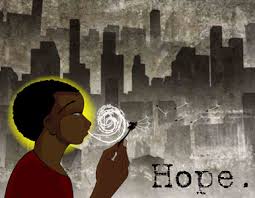Aesthetic expressions, such as photography, art, culinary creations, and poetry have been deployed by social justice organizations as mobilizing and sustaining forces, particularly in African American communities. Indeed, the creative arts not only have the capacity to articulate political and communal sentiments, but, as Mary Stone Hanley explains in You Better Recognize!: The Arts as Social Justice for African American Students, “The arts also can challenge the invisibility and silencing that come with subjugation. Artists can speak to power and reshape culture through their creativity” (420). The student experiences that are shared in this section consider art and artistic expression as a “just action…a way to record history, shape culture, and promote imagination, conceptualization, and individual and social transformation” (420).
sustaining forces, particularly in African American communities. Indeed, the creative arts not only have the capacity to articulate political and communal sentiments, but, as Mary Stone Hanley explains in You Better Recognize!: The Arts as Social Justice for African American Students, “The arts also can challenge the invisibility and silencing that come with subjugation. Artists can speak to power and reshape culture through their creativity” (420). The student experiences that are shared in this section consider art and artistic expression as a “just action…a way to record history, shape culture, and promote imagination, conceptualization, and individual and social transformation” (420).
The creative or poietic power of the arts in social justice initiatives is manifest in the students’ experiences with a local Girl Scouts troop, a homework club, the Kids’ Cafe at Hope Station as well as through a spoken word poetry workshop at the YWCA. Students taught junior scouts about environmental justice and sustainability by planting seeds that would help them earn a flower badge and through a digital photography project that captured the beauty of their physical environments. They also, with the assistance of local children, painted murals as part of Hope Station’s renovations. Others worked in the area of food justice, developing menus and preparing healthy meals for children after school. Finally, the students who led a spoken word poetry workshop provided a safe space for community members to break silences about their lives and experiences. After reading their reflections, one may come to understand the ability of the individual and communal imagination to strengthen societies.
Leave a Reply